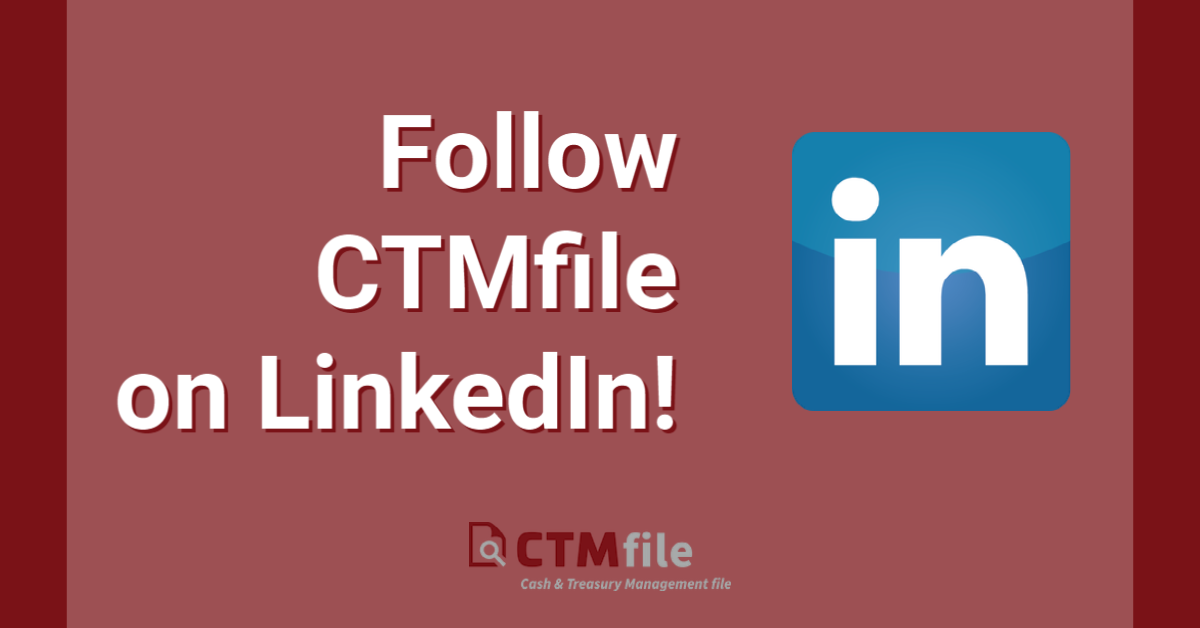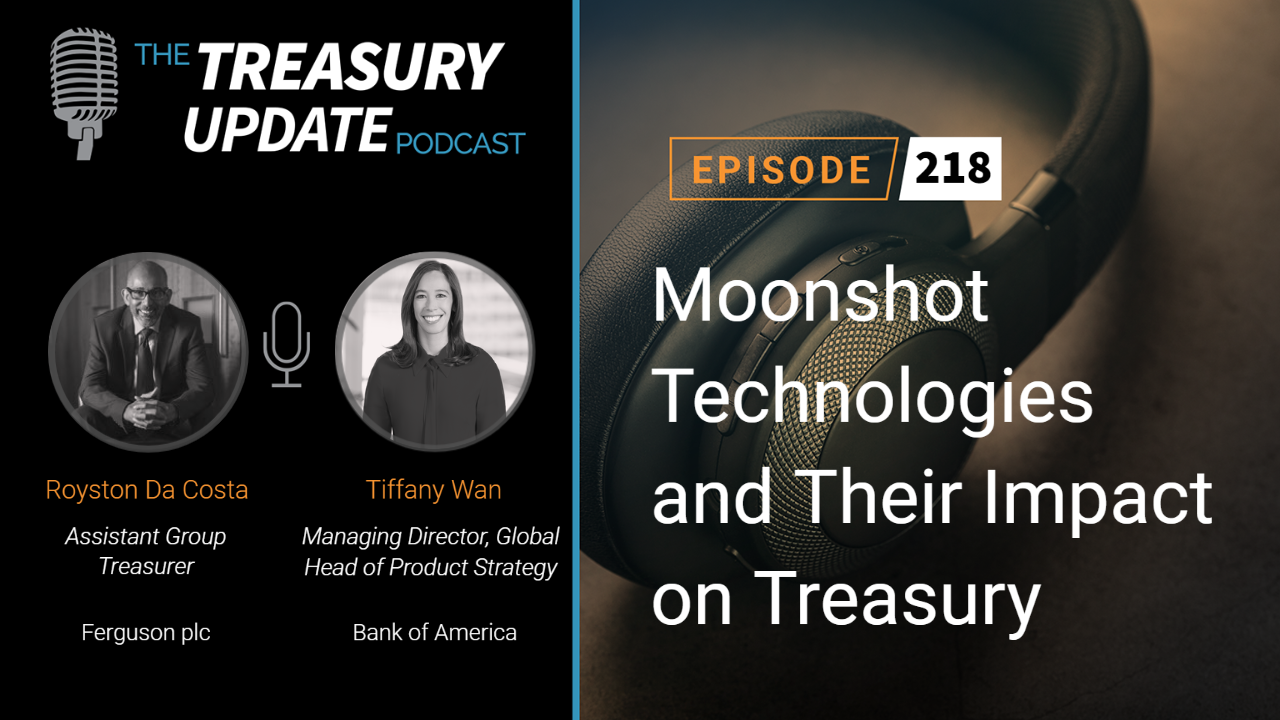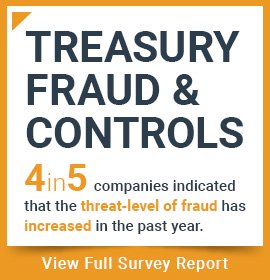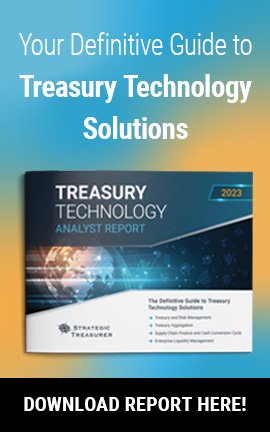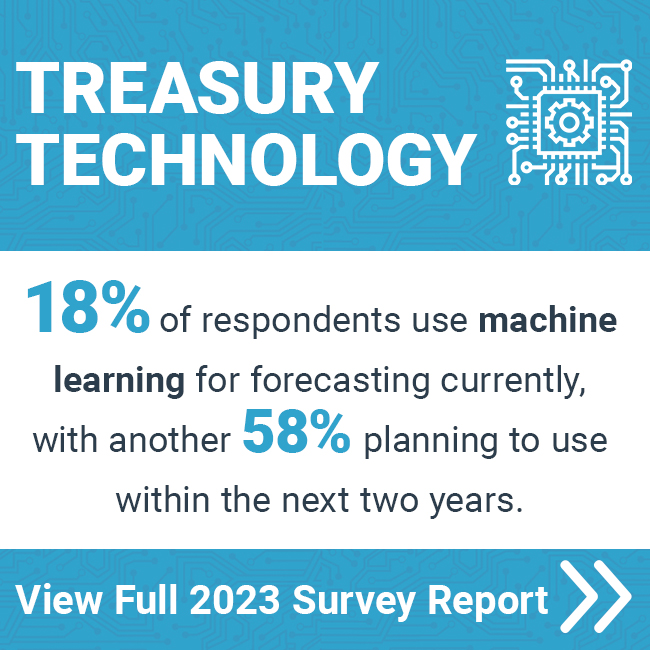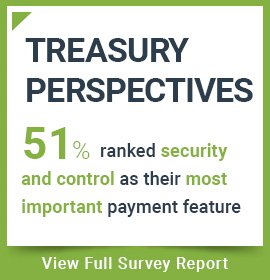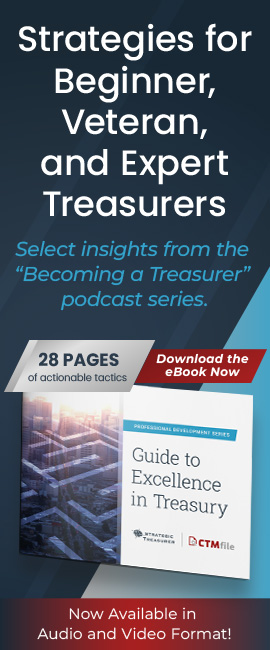
Episode 222
Treasury and New Technology:
6G, Metaverse, and Digital Assets
Host:
Craig Jeffery, Strategic Treasurer


Speaker:
Royston Da Costa, Ferguson plc
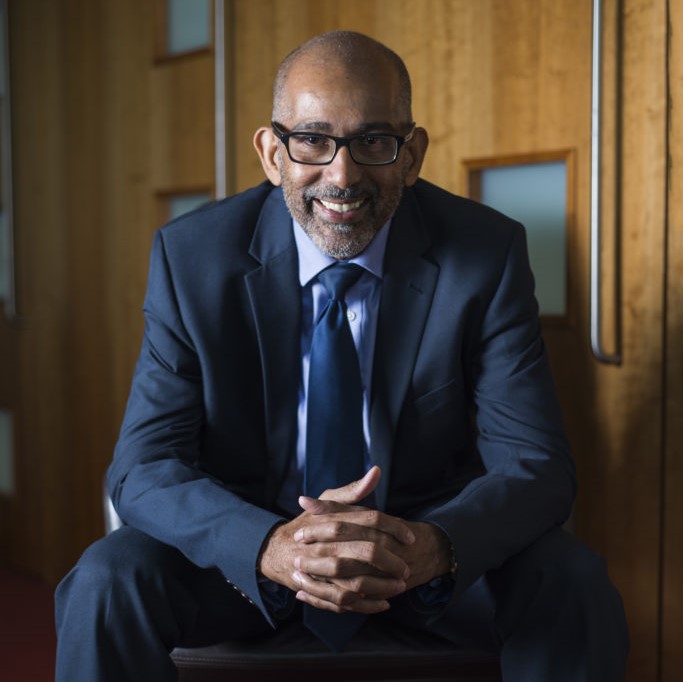

Speaker:
Tiffany Wan, Bank of America


Subscribe to the Treasury Update Podcast on your favorite app!
Episode Transcription - Episode #222: Treasury and New Technology: 6G, Metaverse, and Digital Assets
Announcer 00:04
Welcome to the Treasury Update Podcast presented by Strategic Treasurer, your source for interesting treasury news, analysis, and insights in your car, at the gym, or wherever you decide to tune it.
Craig Jeffery 00:19
Welcome to the Treasury Update Podcast. This is Craig Jeffery and we are continuing our conversation on new technology. Today we’ll look at 6G, metaverse, and maybe even digital assets. And I’m joined again with Tiffany Wan from Bank of America and Royston Da Costa from Ferguson. Welcome to the Treasury Update podcast, Tiffany and Royston.
Tiffany Wan 00:39
Thank you.
Royston Da Costa 00:40
Thank you. Craig. Looking forward to this discussion.
Craig Jeffery 00:43
We had a conversation earlier about technologies and think the title was Moonshot Technologies. That was quite fun. We had so much content. We have a lot left over. But let’s let’s get started. You know, what is the technology that we’re referring to when we when we think about 6G, metaverse, and digital assets, maybe we can begin with 6G who would like to go first,
Tiffany Wan 01:07
I’m happy to cover this one. So 6G the metaverse and digital assets, it’s tough to think we only have a few, we only have a few minutes together to cover all three of them. Because we were just actually having a conversation before we started recording about how they’re actually almost interdependent, or maybe even enabling technologies of each other. So the way I think about it is obviously think everybody at one point was on 3g. And then there was 4g. Now we’ve got you know, 5g, think about that, that’s like almost when you’re on your cell phone, the little icon in your upper right hand or upper left hand corner. And then 6g is really the sixth generation of telecommunications or mobile systems. And really, I think the key thing with this is it’s all about the speed, right? The speed that you can enable, and the volume essentially, I guess, or the capacity of data that you could handle to transmit over the the telecommunication system. And the reason why I was saying their enabling technologies is that if you think about the data that needs to be shared in order to transact in a digital world, or even the type of virtual reality technology that you need to employ, in order to make that digital world come to life, you need to have the ability to constantly be uploading and sharing information at a very, very high speed. Because think about in your own life if you’re on Zoom. And how many of you have ever been on Zoom, and you’ve just gotten frozen, and it’s probably a really frustrating experience. Imagine now you’re trying to transact or do something really cool with a bunch of people in a virtual world. And your telecommunication system can’t support you. So either things look pixelated, or you get frozen when you’re in the metaverse. That’s why 16 is going to be important at least. And that’s how I think about it is related to the other two technologies that we talked about, I think for a treasury perspective, and then I think it’d be good to hear from Royston 6G will be important or is important. Because think about all the data that’s really essential for a treasurer and think about the volume of the data being created as we enable new payment rails, as we digitize invoices. And really, as we digitize a lot of the clearing mechanisms that we’ve relied on for a long time to make unsettled payments, the ability to process more data at a fast pace, and employ technologies like machine learning or artificial intelligence. And to be able to do that on the go maybe from your phone, because most treasurer’s, maybe nowadays don’t want to sit behind a desk all day. That’s where 6G I think is really going to come into play. But curious Royston, what do you think about this?
Royston Da Costa 03:48
Thank you, Tiffany’s done an excellent introduction to the topic. So I was gonna say, in terms of 6G, I’m probably the last person to to sort of talk about it, given that I’m still on 4g. But I definitely believe look in terms of technology as treasures. I mean, it’s almost a cliche to think of technologies like 6G is something of kind of, you know, something to wish for somebody to dream about. Because one of the things I’ve noticed about 6G And they say is it’s about speed, right? That’s clearly what it’s bringing to the party. It’s part of the next generation telecom networks that’s faster than 5g, and I just picked this up while you’re talking. It’s apparently one terabyte per second. download speeds now, the little I know, but that in terms of broadband, that’s fast, by any standard, I think my broadband speed locally is something like 150 megabytes per second. That’s megabytes not even terabytes. And my colleagues say that’s really good. Where were we in the UK? I know in the US you have much better speeds frankly. But that’s part of the differences I guess, but the point One thing other than this treasures, we value, anything that’s going to give us the information faster and more accurate and accessible. So definitely something like speed will come into play, I want to share very quickly might not be particularly, you know, sort of top of anyone’s list. But I’ve noticed even today with one of the companies that it’s a large market data provider. And they were talking me through some of the information they offer me told me, they’ve got this app, which fine, everyone knows we’ve got apps, but I hadn’t heard about it before. But on top of that, they mentioned they’ve got API’s now that API’s have heard for lots of years. But the problem I’ve had is, I’ve never seen the value because no one’s actually been able to show us where it can bring value. The point I’m trying to make is when you’ve got all these different technologies that are kind of bubbling along huge speed, it’s absolutely vital that treasures we try and grasp those technologies where they’re going to add value. So you know, the speed would be one matter, you know, getting that sort of six g accessibility, but then also be able to access API’s, which then gives you that data at your fingertips instantly. And you’ll never have to worry about Oh, have I got a signal? Is the signal strong enough? Is that data available to me? It’s paramount in our industry that having access to that information, and having the tools to give you that information is there and it’s in you can take advantage of it. So I mean, certainly on six g, where can I sign up if that was a choice? I know we’re going to talk about some of the other areas like the metaverse and digital assets. But I just want to pause there. In case you’ve got any questions grade,
Craig Jeffery 06:45
6G, if you talked about a terabyte, compared to what you have that 6000 times faster, we have fiber in the office one gig, it’s 1000 times faster. And with a gig we can do. I have, I don’t know 20 meetings, where we’re doing high def, streaming of what goes on, we can take phone calls, with no drops at all, because of the resiliency and the high level of latency, we get really, really strong. And so that makes a difference. And communication can be more robust. When you’re remote. And I imagine there’s we’re gonna be talking about how that can impact other things. Like if you’re, if you’re talking to your doctor, for example, and you can hear them that’s great, then you can you can see them on the consult. But what if they’re doing remote surgery? You certainly don’t want any lag time there. If there’s a you know, some knife. I mean, I’ve read some things in the medical side. So I want to tie that back into the treasury world. Like where what do we do with the speed? I know we’ll use it, we always use speed. And we use capacity. It’s um, it’s we come there’s no shortage of new ideas that will fill those those gaps. And so I’d love to hear some of those. But let’s, let’s shift onto the metaverse, too. So this Metaverse, we hear that a lot. There’s everyone has their own Metaverse, Facebook has theirs, we’re going to be wearing Glass on our eyes, that we’re that we’re interacting. I know some people do their exercises with other groups of people wearing headsets. And they find it’s it’s immersive, and you don’t have to drive to a gym somewhere. So it’s changing parts of our lives. But when we think about the metaverse, how would we how would we think about that, maybe we’ll reverse the order. Royston, you go first, and then Tiffany, you can jump in as well,
Royston Da Costa 08:28
Very much along the lines, what we’ve said, so far, when you’re having a meeting, it’s so frustrating, the line drops or you’re not getting a clearer connection. And these problems that really we shouldn’t be having today, given we’ve just discussed, one of the sort of solutions. But when you think about treasury in terms of some of the more sensitive type of work that we handle, mainly payments, this is where it becomes absolutely paramount that you have the technology that can support and is robust enough to support your your kind of your daily operations if you like. And I think that you know, the companies that are able to take advantage of these types of tools or technology. I mean, I’m thinking in particular, and we haven’t specifically mentioned that the quantum computing is another technology that kind of supports the whole concept of being able to handle vast amounts of data, and exponentially tend to the time that it takes us to handle this day. But not surprisingly, only the largest companies or fintechs in the world are known to have what they call supercomputers, namely Google, Microsoft, Amazon, that sort of companies. And I expect that they will probably hire out that type of computing power to the rest of the world or the corporate world anyway. And the reason why that’s so important, certainly for corporate stack fixing is that the data that we’ve always kind of like any other corporate had a challenge with trying to process can be easily processed using supercomputers. Because the analogy I’ve always been given around the difference between a normal computer and some of these super computers is the fact that a normal computer which uses binary digits when ones and zeros can, obviously using AI, identify the grains of sand on the beach quite quickly, certainly more quickly than a human brain could. Whereas with quantum computers, they don’t need to analyze those grains of sand, they can go straight to that particular grain of sand that you want to, to sort of select without the wind in a fraction of the time that would take a normal computer today. So if you apply that to cash flow forecasting as an example, in Treasury, you can see the benefits that we would gain from that. Not to mention when you bring in cryptocurrency and the amount of energy it takes to kind of process all these great those, that whole ecosystem, it needs to go down that path of where we need technology that’s not only more powerful, but also far more efficient. And that’s a thing evolving as we speak.
Craig Jeffery 10:59
Definitely, what would you what would you say to that?
Tiffany Wan 11:02
Well, one thing that just for some of the folks listening in, I just want to clarify like i It’s confusing for me sometimes and for our clients like what even is the metaverse or what constitutes it, I think Craig, like you said, there’s many, many different instances of it. So from our clients, there’s two primary ways that they are thinking about the metaverse, and they have they do have implications from a treasury perspective too. There’s close I would say closed loop versions of the metaverse. So these are virtual ecosystems that are owned and operated by a central authority. So many of these are popular in the gaming space, which these are some of our clients too. So think about Fortnight either you or your children have spent a lot of money on Roblox. That’s another example of one. But they are they are really full virtual ecosystems enable that where people can transact. And when they’re transacting. They’re usually using credit cards or debit cards, or kind of the same types of payment methods that you might use for E commerce. But it is a full and robust economy. Like you can go in Fortnight you can buy skins for your avatar, you can attend concerts, you can win, you can essentially win quests and gain resources. But again, if you are, you know, interacting with one of the central meta centralized metaverses the way that you’re going to make payments receive payments is going to be along more of the traditional rails. Then you’ve got open metaverses which are really web three metaverses. These are built on the kind of the same premise or philosophy of blockchain technology, meaning that they’re not necessarily controlled by one central operator. They’re really controlled by the users of that of that Metaverse itself. So a couple of popular ones out there. One is called Sandbox and other one is called Decentraland. There’s another one also called Somnium space, honestly, they keep popping up all the time and these different ecosystems, virtual ecosystems, again, they also have different principles and philosophies, I would say Decentraland, which is a very popular one has really almost become another channel for E commerce or it’s really economic or marketplace driven. So a few what we’ve seen is a lot of companies in the consumer and retail space, essentially use this virtual ecosystem as a way to drive real world purchases, and almost again as another channel for for E commerce and engagement with our customer segment. However, because these are open meta versus the primary way that you buy and sell goods, is via digital assets are digital currencies, which has huge implications if you are the treasurer for this company that is all of a sudden, active in one of these open Metaverse ecosystems, because you have to figure out now how you’re going to deal with the conversion of Etherium back to US dollars or pounds or euros or whatever is the comb currency of your company. You’re gonna have to figure out how you process those payments and accept them from consumers and other businesses that might be engaging with you in the metaverse.
Craig Jeffery 14:06
So if my son is saying, I’m going to, I’m going to play Fortnight tonight for six hours. And I’m like, is that a good use of time? He would have a better better take if he said I’m going to be studying the metaverse trade and interaction on this new environment. And then thinking about the interactions on Treasury that would be that’d be a better way to say then.
Tiffany Wan 14:27
Exactly he could say I’m doing I’m doing primary research for you for your next podcast.
Craig Jeffery 14:35
That is That is awesome. Yeah, and so it’s um it’s like why do people buy skins when there’s free skins you can you can certainly get why people are playing and they can upgrade their their defenses or their their weaponry if it’s that type of game. But as you said, these these open environments, and if you’re selling something in the digital realm, treasure may not want that exposure to some of these digital currencies and need to kind of back to their, their their primary operating currency. Yeah, that’s good. So that’s that’s the metaverse, generally. And you talked about some of the digital assets there. What else should we be thinking about in terms of how this is important to Treasury in terms of interacting here and trading? Right? There’s there’s the advertisement space, if this is where people are, and you have some sort of interaction or you’re sharing, you’re sharing data, or you’re advertising and you need to be in that space, you might be just buying into it. What are what are some of the ways that companies will interact in the metaverse that has a touch point with Treasury?
Royston Da Costa 15:39
It’s funny that the comments you made and Tiffany were making. It’s my perspective, this generation already engaged in the metaverse and to some degree, what cryptocurrency looks like and I don’t think they’re going to have such a as difficult time maybe as our the previous generation in, you know, sort of fixed, you know, certainly in terms of the future treasure in using that. That medium of exchange. But I think there’s good news for corporates that are concerned about cryptocurrency because one thing that I think I’ve learned certainly in last few months, is that customers are actually driving corporates to accept cryptocurrency. In other words, they’re looking to like send in advertising industry to purchase NFT. So I know that Nike, for example, have already had to accept cryptocurrency. And so when you look at it from a treasury perspective, I understand and we’re no different in terms of purchasing when are looking to invest in cryptocurrency or to hold cryptocurrency. But what about those companies that have been they are called forced to accept cryptocurrency from the clients? Now, the good news there in terms of Roger Fotolia, is there is a solution. The solution isn’t in terms of the cryptocurrency referred to as sitting on that or investing or there’s no magic solution. It’s converting that exposure almost instantly, to a fiat currency. And there are companies out there like the one that I presented to finance called BTC. To who do that sort of thing, support corporates who wants to kind of, you know, convert whatever cryptocurrency you receive, whether it’s Etherium, Bitcoin, or even a stable cryptocurrency. But the important point to bear in mind when it comes to cryptocurrency is that corporates will have to recognize they have to setup a separate structure in terms of their treasury policy. And I’ll say to you early on, Craig, that is the first time in my career where I’ve been had to recognize that in managing risk, if we were looking to set up a cryptocurrency structure within our company, we have to involve our IT folks, you know, ci, CIO, and possibly procurement. Because we’re not just managing risk from a trade perspective, you’re also managing risks from a cybersecurity perspective. And this is why those stakeholders become vital to this particular type of transaction and companies I’ve been in networking with, have been telling you that. So there’s a whole kind of raft of processes and sort of, you know, steps that need to be taken, but no different to what we’d normally do in Treasury when we look at any new error in terms of how we manage risk, but it’s definitely not something we should shy away from. I think provided you are getting sound advice and you make sure that you are suitably protected and hedged. This is an area that I think we have to engage with as as we move forward in this new world of the metaverse.
Craig Jeffery 18:35
Tiffany, did you have anything to jump on what Royston said, yeah.
Tiffany Wan 18:40
Well, I would say one of the things he touched upon this already but that is going to be really key is that on ramping and off ramping between these ecosystems and the exposure that it creates? So like Royston mentioned there are companies out there that do help with this today, but I gotta say, I mean, I do sit at a bank, obviously Bank of America but banks are really good at helping on ramp and off ramp from different payment rails and different payment ecosystems. Right now, though, there is demand as ricin said from consumers may be who wants to pay for goods, not necessarily even in the metaverse but maybe other types of goods with cryptocurrency, which then is leading to pressure on Treasury to be able to do that type of FX conversion. Banks would love to be involved. But what we’re missing right now is regulatory clarity. So you know, just a line in the sand one way or the other. So one of the things that I know, when you talk to even some of these companies like a b2c to who’s in this space right now helping with this type of conversion, even they would welcome regulatory clarity because at the end of the day, even someone like a b2c too, needs a bank behind them in order to help facilitate this on ramp and off ramp and FX exposure that accompany like a Ferguson is going to lean on them for at least in the moment in order to help facilitate those types of crypto cars. and see transactions. If anyone out there is listening to this from our friends at the OCC, maybe, or anyone on the regulatory side, one thing that would be really helpful for banks and other actors in this space, I think is some clarity. One way or the other around digital assets, digital currencies, stable coins, and someday may be a central bank digital currency as well.
Royston Da Costa 20:24
I’m sorry, Craig. Can I just come in there quickly, Tiffany makes an excellent point. It’s about counterparty risk. And frankly, this is an age-old topic we’ve had, ever since fintechs, came on scene about the disruption of fintechs could create could cause the banks and I’ve always been a firm believer, I’m not just saying that, because Tiffany is on this call. But they will always be a place as far as I’m concerned for banks in our ecosystem, at least, certainly my my life span. And I think for longer, because simple reasons that the fintechs for the vessel that was much of they’re very good at what they do. From a corporate perspective, we’re not going to be able to allocate the same amount of kind of financial counterparty risks with them that we do with the bank. You know, many cases there were these fintechs are very young, very small companies compared to banks. And so typically, although the the solution is there, for converting corporate cards to fiat currency, the amount that we could possibly look to putting in terms of risk management will be a lot less from a corporate perspective than we currently do with our banking partners. So that’s a fair, that’s an excellent point at Tiffany’s. Right, because that’s exactly the challenge that we’re facing today, or corporates are facing. So they say, in when you engage with fintechs versus banks.
Craig Jeffery 21:47
Yeah, some some good points, there’s some new new terms or less commonly used terms that both of you mentioned, and they seem to be coming back coming into our regular language. Now, it talks about converting digital to fiat directly. And I just, let’s just think about what we’re saying their digital currency, what is it it’s, it’s stored digitally, backed by what backed by, you know, either a central bank, backed by some issuer backed by the value in the marketplace, where it tends to be very volatile, fiat currency, usually backed by a government, the full faith and credit of whatever the particular government as are their central bank. And so we think about both of those, it’s like, I don’t know anything about currency as fiat currency. But we do think of digital and so that language is interesting as it’s used. And it’s, but we have to think about this, we transition from physical to virtual very quickly. So I mean, you hear people talking about bank accounts and virtual accounts, a virtual account is not a real account, when they do a real account, people put their hands up and make a box, like there is a physical account, it’s a digital account already. And it’s virtual, it’s tracked. And so virtual accounts is just a way of doing sub accounting and sub tracking. And so we’re already away from the, we’re already away from the physical. And we’re just taking the next step. It’s just the next incremental step, though, an issuer of digital currency, if they’re not a central bank, they don’t have a taxing authority, whereas a central bank has the ability to tax to raise to raise funds or to, you know, to change how, how they can support it. So there’s, there’s some differences there. And those terms are, those terms are interesting. So in one sense, it’s, it’s very different. We use different terms. But in another sense, it is just the next step. And I’ll give you a small, physical world example. We’re going to the AFP conference. And I’m not sure when this podcast would come out of might come out about the same time as that. We usually give away a big Yeti cooler, it’s a way of getting people to come in and talk and they drop cards in physical cards. They also scan things in right more and more scanning. But we have so that we have this other giveaway thing and our marketing group had a Yeti cooler, printed, somebody printed a Yeti cooler, it’s about the size of your thumb, maybe a little bit larger. And then like oh yeah, this person has printed 3000 or 30,000. Maybe it’s 30,000 of these little mini YETI Coolers that work. I mean, they’re not you can’t store stuff, I mean, they they open closed, they have the handles. And in the same way some some of the digital assets you’re talking about are you know, we take digital pictures now we don’t have the we don’t have as many physical prints as we used to where you get them back from the store. Now they’re being saved digitally. So really good. Good things to think about. You talked about serious Treasury items about regulatory clarity counterparty risk, and if someone’s paying you you want to take that payment, you may not want to be exposed to digital currency and we have we have a couple clients. One is they take a lot of gifts and people give gifts in the form of two Digital currency. And so they have to have a policy on how to handle it, how they convert it to a fiat currency in this case to US dollars, or another one who’s using and storing and looking for methods of handling the, you know, the custody of these, these assets and recording, recording these carefully. So this is no longer just a theory or argument about something that’s virtual. It’s it’s becoming, at least played with and piloted at different companies. As we look at the perspectives there when we see it being used in some ways, and it’s kind of early days. How do we think this is going to be more widely used? When is that going to happen? What’s the risk of just saying, we want to watch this and wait till it’s we get a response somewhere? Or is there something that we should do to get engaged with it with it earlier? Whether it’s whether it’s digital assets are the metaverse, certainly we don’t have to do anything with the six g. But as we think about these capabilities expanding, what should we be watching for which we engage in?
Tiffany Wan 26:04
So I sit in product strategy seat at Bank of America. And one of the things that’s always a challenge for any business, it doesn’t matter if it’s the bank, it doesn’t matter if it’s Ferguson is competing priorities for limited resources. So you have to think about where am I going to put my tech dollars where I’m going to put my tech capacity where I’m going to put my product people, Royston is probably thinking about where’s he going to put his treasures his AP people, his AR people. And the thing that I guess I have the luxury of sitting at Bank of America, is that I sort of flip it the other way around. And I think a lot about opportunity costs. So what’s the cost of inaction? And I have a master’s in economics and in international finance, and so I maybe this is a little dorky, but I think a little bit about expected value. So if the opportunity size for digital assets. Metaverse is a trillion dollar opportunity, but there’s only a 1% chance that that’s ever going to take off. Well expected value would tell you there’s probably something worth paying attention to. And I’m not saying that every treasurer out there should be going and engaging with third parties to start accepting cryptocurrency today. I’m not saying that every company needs to be building a presence in the metaverse. But what I think these companies can do and what the bank has been doing, is getting your hands a little bit dirty and getting some real direct experience with these types of currencies and with these universes, because it’s very hard, I think to understand them, or opine on them or really analyze them. Unless you truly have direct interaction with them. It’s really hard to sit in my seat and advise someone like Royston about what he should be doing in the metaverse or not be doing in the metaverse if I’ve never even gone in there or tried to buy an NFT or interacted with it. And I’m not saying right like the the bank is setting up virtual branches or something like that, by no means. But do we have a team that can look into these sorts of emerging technologies and play around with them and get firsthand experience? Absolutely, because that’s how you dispel a lot of myths. But that’s also how you identify what are those real tangible opportunities for the bank? And then obviously, for our clients like Ferguson in the future.
Craig Jeffery 28:21
Maybe you should tell Ferguson and Royston to build build more stuff in the metaverse. You know, it’s like, we took over some additional space. And we had cabinets cabinets made, we laid out the floor plan. And they gave us these 3d models, right. So you can see the cabinets and open them and move them around. And so it’s no longer like picture, if you will, it’s like Here are pictures that you can see and model and they create them in CAD. And it’s very easy to visualize the space. So why why not? Royston? I’m expecting if I re remodel my bathroom, you can show me and say here’s what the here’s what it looks like I can go in and it’s like, no, you don’t need that $400 $500 toilet. You know, that’s not nice enough unit that $5,000 Japanese toilet with the sensors and all the cleaning functions. And here’s here’s how you can swap out stuff on the sink. And then you can pay for it. And it’s like, not only will you get the stuff that you can use, but you can have your own digital versa. You were talking about the twin twin reality I forget what the digital twin was.
Tiffany Wan 29:26
Just before Royston, you jump in? Craig, I think you do raise an excellent point to that. These technologies you don’t have to go all in either to get that firsthand experience. So you know, putting 3d Or putting immersive experience or augmented reality version which is I think what you’re talking about Craig, for designing, doing like the design or architecture for your house. That’s like a safer, easy way to start getting you’re putting your toe in the water. Maybe Royston like getting yourself an Oculus headset and instead of doing a Zoom call doing a meeting in there. That’s another way that’s like a very, you know, easy way to start dipping your toe in the metaverse water without actually having to go all in and set up a, you know, Ferguson HQ in Sandbox.
Royston Da Costa 30:13
Is that a challenge? I guess it is. But you know, look, I mean, the future is limitless, in my view, right. I mean, there are films that were made 30 years ago that we’re only seeing the reality today, there was something called I think Disclosure with Michael Douglas. I was reminded by my wife the other day where they looked, I believe or not that Metaverse 30 years ago, the film was made. And we’re looking at tried it anyway. But coming back to the points that you raised, and look, to be honest, a lot of what we’re discussing today wouldn’t be on my radar if it wasn’t for Bank of America’s Moonshot Initiative. So I’m eternally grateful, actually, to Tiffany and her bank and in many respects, for facilitating this discussion, and also raising awareness, which is, I think, key for for our industry. And one of the things that also sort of mentioned, is that the point about when this is going to happen, I mean, it’s certainly happening as we speak. And why is it in my view, important that people or corporate should take more notice, like Tiffany said, no one’s I’m certainly not either, suggesting people should kind of engage in the metaclass tomorrow or today, and start sort of using cryptocurrency. It’s all about being aware and increasing your knowledge around that. Good example, from my perspective is cloud based solutions. Six years ago, we implemented our current system group, and it was quite new to our group. And then, three, four years ago, I was presenting on cloud based solutions, a lot of couples are still very apprehensive, very special, almost cynical about the cloud because the security concerns the hack. Since the pandemic hits, Sloane Behold, most corporates saw the value and had no choice but to enter on the cloud. Today, I think you’ve got to look at it from a commercial perspective. But like Tiffany alluded to early on, if you look at the opportunity cost of what you’re going to miss out, if you don’t be prepared, same classic cryptocurrency, the least you can do is actually make yourself equip yourself with information. So when your CFO comes and knocks on your door, if your treasurer saying, What do I need to do to open a cryptocurrency account, you will be well placed to know what the pitfalls are, who the main players are, what would you need to do, but one thing is very clear to me in terms of the future, I like definitely again mentioned slightly earlier, the banks will play a key part in how this kind of begins to take off in terms of cryptocurrency, because we need the regulators as always, as obvious. But in order for this to really become more mainstream, I think the big banks like Bank of America and so on, will play a key have to play a key role in how corporates look at engaging in this currency in a much more commerce mainstream fashion. For the simple rule. I mean, you know, from my perspective, the basics of cryptocurrency, forget the volatility. If you’re looking at a regulated cryptocurrency, the benefits of using cryptocurrency around speed 24/7 There’s not going to be issues around validating. You know, it’s it’s kind of a no brainer for me.
Craig Jeffery 33:23
I know it seems like we just got started on on today’s today’s discussion. And we like It’s like we barely scratched the digital surface of of all these items. Maybe Tiffany, you could lead us off with any any final thoughts, and then Royston. I hope we can meet again and talk on this on in a few other developing technology areas and the impact on Treasury?
Tiffany Wan 33:46
Well, I definitely would think it would be great to have another chance to come back and discuss with both of you ESG. So I feel like it’s become a really prolific topic in treasury of the month not of recent but I think it’s now maybe falling I should say the responsibility for ESG on our CFOs and treasurers even more and more. But I would say look like I I love experimenting, reading and learning about these technologies. I don’t think that I could go one day without clicking on Reddit and going down a rabbit hole trying to learn something new. But I think the key part, at least for us sitting at Bank of America is that we’re lucky and fortunate to have partners like Royston, Ferguson, who are willing to go on this journey with us because ultimately, what we’re trying to do is leverage these technologies to make a better customer experience for Royston but also for Oistins and clients. So the thing that I think I would leave this group with is definitely remain intellectually curious. Definitely go down and chase those rabbit holes when it comes to these technologies. But always, I think, remember in the back of your mind, like what is the challenge that I’m trying to solve? What is the experience that I’m trying to create? And how can these techniques ologies whether it’s digital assets, or, you know, employing you’re working in the metaverse or maybe doing something enabling a service in the metaverse thinking about how to take advantage of faster higher capacity telecommunications, thinking about what is the challenge that’s really helping yourself and bringing it back to that, that real world most immediate pressing issue,
Craig Jeffery 35:21
sort of adventurousness with a keen eye towards practicality. Thank you so much, Tiffany. Royston,
Royston Da Costa 35:30
what can I add to that? Said perfectly Tiffany, but had to say I look at it from two ways One, as a treasurer, what are the tools that I need to do my job and our jobs better, more efficiently? And obviously, you know, more more quickly, if you like, and clearly technology today. It’s a Pandora’s box. I mean, we are being spoiled, I think. But as always, we have to excise our caution. And you know, sort of, we have to be careful in terms of what what rabbit holes you go down as well. There’s no harm, like Tiffany said, you know, the difference for me, in the 34 years I’ve been a treasure is that previously, it’s quite difficult to go down this rabbit hole and try it out. Today, you’ve got sandboxes, you can try it out. And the worst you do is lose a couple of weeks, the costs hardly anything involved. So the opportunity is there for treasures. But the other point, which is very, very important, in my view, it’s the changing demographic that we have in the world. And in Treasury, as we speak, each day goes past. And we’ve got a new mindset, a new group of treasures are coming into the workplace, who have an expectation of what they would accept as the benchmark for engaging or sorry, performing the role they need to perform. So I know, dare I say, great. And you might remember the day when we had faxes and some of the older style technologies. Well, lo and behold, if a company will be using faxes, then I would imagine most Gen C’s would would run a mile, not to mention one thing checks are different in the US. But in the UK, I don’t think many of this generation have come across checks. The point being that, you know, companies have to recognize that we have to move forward with the technologies. And the third aspect to this is the important relationship that it now play with Treasury in the way that we move forward. So not surprisingly, since I’ve been engaging with the Bank of America Moonshot Initiative, our CI so I wouldn’t say bank but has been extremely enthusiastic about joining those webinars and hearing what does the banks been putting on in terms of showcasing the various technologies? And that’s the name of the game here. Everyone wants to be in the know. We want to know what’s up ahead what’s available today. And how is this gonna add value to our business? That’s all it comes down to.
Announcer 38:07
You’ve reached the end of another episode of the Treasury Update Podcast. Be sure to follow Strategic Treasurer on LinkedIn. Just search for Strategic Treasurer. This podcast is provided for informational purposes only, and statements made by Strategic Treasurer LLC on this podcast are not intended as legal, business, consulting, or tax advice. For more information, visit and bookmark StrategicTreasurer.com.
Related Resources
CTMfile is on LinkedIn!
Get the latest treasury news right to your daily newsfeed by following CTMfile on LinkedIn.
Moonshot Technologies and Their Impact on Treasury
In this episode, Craig Jeffery talks with Royston Da Costa of Ferguson plc and Tiffany Wan of Bank of America on how moonshot technologies will impact your role in treasury. Set yourself apart in your field by staying aware and informed on any revolutionary innovations.




